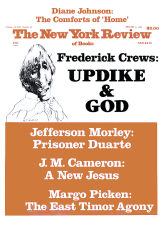In response to:
The Siege from the September 25, 1986 issue
To the Editors:
I would like to add some reflections on American higher education to Professor C. Vann Woodward’s review of Ellen Schrecker’s No Ivory Tower [NYR, September 25]. There is in fact a long history of suppression of dissenting faculty members in institutions of higher learning in this country as I am sure Ms. Schrecker and Professor Woodward are aware. Academics were unwitting accomplices in such policies by virtue of the fact that, beginning in the last decade of the nineteenth century and continuing up until virtually the present day, they insisted on deluding themselves with the false ideal of “objectivity” (as contrasted with, say, fairness and compassion). Once it had been established as a kind of natural law of the profession that professors were supposed to be resolutely objective and therefore of necessity above the battle, it was simple enough for state legislators, trustees, and administrators to fire them for taking unpopular “partisan” positions on controversial issues. In taking partisan positions, it was argued, professors were sacrificing their objectivity. In the 1890s this argument was used as an excuse for firing anti-Populist professors in ardently Populist states and firing Populist professors in anti-Populist states.
The University of Chicago was John D. Rockefeller’s private fief. When the distinguished economics professor, Edward Bemis, offered a course entitled, “The State as an Agent for Social Amelioration,” he was allegedly told by Walton Clark, superintendent of the United Gas Improvement Company, “If we can’t convert you we are going to down you. We can’t stand your writing. It means millions to us.”
Bemis made himself even more vulnerable by supporting the Pullman strikers and denouncing strikebreakers. His colleagues joined in criticizing him for involving himself in “public questions” and although he ostensibly had tenure, he was fired for lack of scholarly objectivity. William Rainey Harper, president of the University of Chicago, declared that it was the duty of a professor to teach a subject, “not his opinions…. He must stand above party lines and be independent of party affiliations.”
In World War I the casualty rate among faculty members (at least in Eastern colleges and universities) who opposed US entry into the war was considerable. Scott Nearing and Carl Haessler were only two of the better known victims of misplaced patriotism.
Perhaps the most trenchant critic of universities’ lock-step conformity with the currents of political fashion was Brooks Adams. In his book The Theory of Social Revolutions, published in 1912, Adams wrote: “In the United States capital has long owned the leading universities by right of purchase, as it has owned the highways [railroads], the currency, and the press, and capital has used the universities, in a general way, to develop capitalistic ideas…. Capital has preferred the specialized mind and that not of the highest quality….” The emphasis was not on theory which might have dangerous ideological implications but on “the intrinsic value of the fact.” Brooks Adams agreed with his brother Henry that the principal effect of the American university was to neutralize scholars and intellectuals who might otherwise have been capitalism’s severest critics.
This was all possible because of the intellectually inhibiting effect of the notion of “scholarly objectivity.”
It thus should not have been surprising to anyone who had followed the history of American academe that professors in the McCarthy years conspired, if only implicitly, in the brashing of their more radical colleagues. Unaware of the fact that they were, by virtue of their supposed objectivity, securely in the pockets of the capitalists, they declared solemnly and self-righteously that the radicals had fatally compromised their objectivity by adherence to socialism or communism, or Marxism, or Soviet Russia (or, earlier, as we have noted, to Populism or the public ownership of public utilities). It is not an encouraging story and there are few indications that, given similar circumstances, the same sad saga would not be repeated.
In all this I suspect that there is not much that Ms. Schrecker or Professor Vann Woodward would object to but I must enter one strong caveat to Professor Vann Woodward’s review. I think it a serious error to equate, even roughly, the stormy events of the Vietnam era on the nation’s campuses with the crudely reactionary politics of the McCarthy years. The Red hunters trampled quite coldbloodedly on the constitutional rights of thousands of people. Trustees, administrators and faculties acquiesced. In the Vietnam period the passionate and on the whole noble convictions of tens of thousands of students often resulted in violence and coercion, in the denial of free speech, the occupation of administration buildings and many other doubtless excessive acts; it was a form of guerrilla theater designed to rouse the conscience of the nation. In that, it seems to me (and to Professor Vann Woodward I gather since he writes: “In the course of that struggle student power, violent or nonviolent, figured in bringing down one president’s administration and putting an end to a war”) they were remarkably successful. The protests of the Vietnam era, wildly irrational as they often were, constituted one of the more encouraging moments in our history; the bitterly remembered events of the McCarthy years one of our darkest.
The most interesting question that remains for the academic world to reflect upon is how it can once more become, as it was briefly in a few institutions like Johns Hopkins and the University of Wisconsin in the 1870s and 80s, a powerful force for peace and social justice.
Page Smith
Santa Cruz, California
This Issue
December 4, 1986



